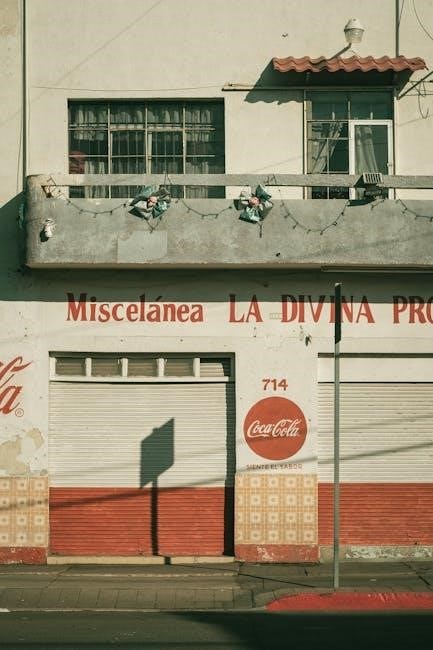The Novena of Divine Mercy is a nine-day prayer devotion honoring Jesus’ mercy, based on Saint Faustina Kowalska’s revelations. It prepares for Divine Mercy Sunday, fostering spiritual growth and devotion through daily reflections and prayers, emphasizing God’s infinite mercy and compassion for all souls.
What is the Novena of Divine Mercy?
The Novena of Divine Mercy is a nine-day prayer devotion that begins on Good Friday and culminates on Divine Mercy Sunday. Rooted in the revelations of Saint Faustina Kowalska, it involves reciting specific prayers and intentions each day for various groups, such as sinners, the faithful, and the departed. The novena emphasizes the infinite mercy of God and seeks His grace for the conversion and salvation of souls. It is typically accompanied by the Chaplet of Divine Mercy, the Litany of Divine Mercy, and reflections from Saint Faustina’s diary. This devotion is a powerful way to immerse oneself in the divine mercy revealed by Jesus, fostering spiritual renewal and trust in His loving compassion.
Significance of the Novena in Catholic Devotion
The Novena of Divine Mercy holds profound significance in Catholic devotion as a powerful expression of trust in God’s infinite mercy. It serves as a preparation for Divine Mercy Sunday, emphasizing the transformative power of Jesus’ compassion. By focusing on intercessory prayer for various groups, the novena fosters a deep sense of solidarity and spiritual unity among the faithful. It also highlights the importance of living out the divine mercy message in daily life, encouraging acts of love, forgiveness, and charity. The novena is a timeless devotion that strengthens devotion to Jesus and deepens trust in His boundless mercy, making it a cornerstone of Catholic spirituality.
Structure of the Novena
The Novena of Divine Mercy is a nine-day prayer devotion, typically beginning on Good Friday and culminating on Divine Mercy Sunday. Each day focuses on specific intentions, such as praying for all mankind, priests, the faithful departed, and souls who have lost faith. The structure includes reciting the Chaplet of Divine Mercy, offering daily prayers, and reflecting on Jesus’ revelations to Saint Faustina. The novena emphasizes intercessory prayer, asking God’s mercy for various groups and individuals. It also encourages acts of love, fasting, and charity, aligning with the divine mercy message. This structured format helps participants deepen their spiritual engagement and trust in Jesus’ boundless compassion, making it a meaningful devotion for Catholics worldwide.

Historical Background of the Divine Mercy
The Divine Mercy devotion originated from Saint Faustina Kowalska’s visions in the 1930s. Jesus revealed His mercy message, which spread globally after her death, leading to her canonization and the establishment of Divine Mercy Sunday.
The Life of Saint Faustina Kowalska
Saint Faustina Kowalska was a Polish nun born in 1905, known for her deep spirituality and visions of Jesus, who revealed the Divine Mercy message to her. Her diary, a key source of the novena, details these revelations. Faustina died in 1938, and her work was popularized posthumously. She was canonized in 2000 by Pope John Paul II, and her feast day is celebrated on October 5. Her visions emphasized God’s mercy and compassion, leading to the establishment of Divine Mercy Sunday on the first Sunday after Easter. Her life and writings continue to inspire devotion worldwide, focusing on prayer and trust in Jesus’ mercy.
The Divine Mercy Message Revealed
The Divine Mercy message was revealed to Saint Faustina Kowalska through a series of visions from Jesus, emphasizing His infinite mercy and compassion for humanity. Jesus entrusted Faustina with the mission to spread this message, which includes the Chaplet of Divine Mercy, the Novena, and the celebration of Divine Mercy Sunday. The revelations highlighted the importance of trusting in God’s mercy, praying for the conversion of sinners, and offering prayers for the dying. Jesus also emphasized the power of the Chaplet, promising extraordinary graces to those who recite it faithfully. This message of hope and forgiveness has resonated globally, inspiring millions to turn to God’s mercy and live with renewed faith and love.
The Spread of the Divine Mercy Devotion
The Divine Mercy devotion spread rapidly after Saint Faustina Kowalska’s revelations, becoming a global phenomenon. Her diary, detailing Jesus’ messages, was translated into multiple languages, inspiring millions. The Chaplet of Divine Mercy and the Novena gained popularity as powerful prayer tools. The establishment of Divine Mercy Sunday by Pope John Paul II in 2000 further accelerated its growth. The iconic Divine Mercy image, painted according to Faustina’s visions, is now venerated worldwide. The devotion emphasizes trusting in God’s mercy, praying for sinners, and seeking conversion. Its universal appeal lies in its message of hope, forgiveness, and divine compassion, resonating with people of all backgrounds and fostering a deeper connection to Jesus’ merciful love.

The Significance of the Divine Mercy Novena
The Divine Mercy Novena fosters trust in God’s mercy, offering hope and forgiveness. It strengthens faith, deepens devotion, and prepares souls for Divine Mercy Sunday, emphasizing universal salvation and compassion.
Preparation for Divine Mercy Sunday
The Novena of Divine Mercy serves as a spiritual preparation for Divine Mercy Sunday, a feast established by Saint John Paul II. It begins on Good Friday and concludes on the Sunday after Easter, emphasizing the connection between Christ’s Passion and His resurrection. Through nine days of prayer, faithful followers reflect on God’s mercy, offering specific intentions each day for various groups, such as all mankind, priests, and the faithful departed. The novena fosters a deeper trust in God’s compassion and encourages participants to seek forgiveness and renewal. It culminates in a joyful celebration of Divine Mercy Sunday, where believers invoke God’s mercy for themselves and the world.
The Role of Prayer in the Novena
Prayer is the heart of the Novena of Divine Mercy, serving as a powerful means to connect with Jesus’ compassionate love. Each day, specific intentions guide the faithful to intercede for various groups, such as all mankind, priests, and the departed. The Chaplet of Divine Mercy, recited daily, emphasizes trust in God’s mercy and asks for its outpouring on souls. Through prayer, participants seek forgiveness, healing, and spiritual renewal. The novena encourages a deeper relationship with Jesus, fostering a mindset of humility and reliance on His grace. By dedicating time to prayer, individuals open themselves to experiencing God’s boundless mercy and love. Prayer unites the faithful in a shared devotion, strengthening their commitment to living mercifully.
The Promise of Jesus’ Mercy
Jesus’ promise of mercy is central to the Novena of Divine Mercy, offering hope and forgiveness to all who participate. He assured Saint Faustina that those who trust in His mercy will experience His compassion and grace. The novena culminates on Divine Mercy Sunday, where Jesus promised a complete remission of sins for those who receive Holy Communion. This promise extends to all souls, emphasizing that no one is beyond God’s forgiveness. Through prayer and trust, believers can tap into this boundless mercy, finding comfort and renewal. Jesus’ promise serves as a reminder of His infinite love and the transformative power of His mercy in the lives of the faithful.

How to Pray the Novena of Divine Mercy
Praying the Novena involves nine days of specific intentions, starting from Good Friday. Each day focuses on different groups, such as all mankind, priests, and the departed. Daily prayers include the Chaplet of Divine Mercy, reflections, and petitions, urging believers to seek Jesus’ compassion and intercede for others. The novena culminates on Divine Mercy Sunday, emphasizing trust in Jesus’ infinite mercy and the promise of grace for those who participate faithfully.
Day 1: Intentions for All Mankind
On the first day of the Novena of Divine Mercy, prayers are offered for all mankind, especially sinners. The intention is to bring all humanity before Jesus, imploring His mercy and grace. This day emphasizes the universal call to salvation and the importance of interceding for those who may not know God’s love. The prayers reflect on the infinite mercy of Jesus, seeking forgiveness and redemption for all people. By focusing on the needs of the entire world, this day sets the tone for the Novena, encouraging believers to trust in Jesus’ promise of divine mercy and compassion. It is a powerful reminder of God’s love for all souls.
Day 2: Intentions for Priests and Religious
On the second day of the Novena of Divine Mercy, prayers are offered for priests and religious, seeking divine grace to strengthen their faith and devotion. The intention is to support those dedicated to spiritual service, asking Jesus to deepen their love for Him and their commitment to spreading His mercy. This day highlights the crucial role of priests and religious in guiding souls toward God. Through the Chaplet of Divine Mercy, believers intercede for these servants of the Church, imploring Jesus to grant them the strength to fulfill their sacred mission. It is a day to recognize their importance and pray for their spiritual renewal and perseverance in living out their vocations faithfully.
On the third day of the Novena of Divine Mercy, prayers are offered for the souls of the faithful departed, seeking God’s mercy for their eternal rest. This day focuses on interceding for those who have passed away, especially those in purgatory, to help them attain heavenly peace. Through the Chaplet of Divine Mercy, participants ask Jesus to shower His mercy upon these souls, cleansing them of their sins and bringing them closer to eternal union with Him. It is a day to remember loved ones who have gone before us and to trust in God’s infinite compassion and love for all souls. The prayers emphasize hope in the divine promise of eternal life and the power of intercession. Believers are encouraged to offer their prayers and sacrifices for the repose of these souls, trusting in Jesus’ boundless mercy to bring them peace and eternal rest. On the fourth day of the Novena of Divine Mercy, prayers are dedicated to those who have received the gift of faith. This day emphasizes gratitude for the blessing of belief and asks for the strengthening of faith in those who already possess it. Through the Chaplet of Divine Mercy, participants implore Jesus to deepen the faith of believers, helping them to remain steadfast in their devotion and to share this gift with others. The prayers also seek divine assistance to guide and protect those who are faithful, ensuring they remain unwavering in their commitment to God’s will. This day highlights the importance of nurturing and growing in faith, trusting in God’s infinite mercy and love for those who believe. The Novena’s focus on this day is to celebrate and strengthen the spiritual lives of the faithful, encouraging them to live out their faith with joy and purpose. On the fifth day of the Novena of Divine Mercy, prayers focus on those who have lost their faith, seeking divine intervention to restore their spiritual connection. Through the Chaplet of Divine Mercy, participants implore Jesus to enlighten these souls, guiding them back to the path of faith. The prayers emphasize the importance of interceding for those who are spiritually adrift, asking for God’s mercy to reignite their belief; This day’s intentions highlight the compassionate heart of Jesus, who desires all souls to return to Him. The Novena’s prayers on this day are a powerful way to support those who have strayed, trusting in God’s infinite mercy to bring them back to faith and spiritual renewal. On the sixth day of the Novena of Divine Mercy, prayers are dedicated to the meek and humble souls, acknowledging their gentle hearts and selfless lives. The Chaplet is offered to strengthen their faith and deepen their trust in God’s mercy. This day’s intentions honor those who embody humility and kindness, reflecting Jesus’ teachings on the importance of a contrite heart. By praying for these souls, participants seek to emulate their virtues and ask for divine mercy to further sanctify their lives. The Novena emphasizes that meekness is a beacon of God’s love, inspiring others to follow a path of compassion and humility. On the seventh day of the Novena of Divine Mercy, prayers are offered for souls detained in purgatory, seeking their purification and swift entrance into eternal life. The Chaplet is recited to implore divine mercy for these souls, trusting in God’s compassion to relieve their suffering. Saint Faustina’s revelations emphasize the importance of interceding for the departed, as their time of purification is a final step toward heaven. This day’s intentions remind us of the Catholic belief in purgatory and the power of prayer to assist souls in their journey to divine union. By praying for them, we honor their memory and participate in the mercy of God.
On the eighth day of the Novena of Divine Mercy, prayers focus on those who fear death, seeking to alleviate their anxiety and grant them peace. The Chaplet is prayed to implore divine mercy for these individuals, asking for strength and trust in Jesus’ promise of eternal life. Saint Faustina’s writings highlight the importance of trusting in God’s plan, even in the face of death. This day’s intentions encourage believers to reflect on the transient nature of life and the eternal joy that awaits in heaven. By praying for those who fear death, we intercede for their comfort and assurance of God’s loving presence. Faith in divine mercy offers hope and solace during life’s final moments. The ninth day of the Novena focuses on praying for the lukewarm and those who have neglected their spiritual gifts. These individuals, often distracted by worldly concerns, are in need of divine intervention to rekindle their faith. The Chaplet is offered to inspire them to embrace their calling and live out their talents for God’s glory. Saint Faustina’s revelations emphasize the importance of spiritual awakening and zealous service to others. This day’s prayers aim to transform apathy into active devotion, reminding believers that God’s mercy can reignite even the coldest hearts. Through prayer, we seek to bring these souls back to a life of purpose and holiness, trusting in Jesus’ boundless compassion and grace. Mercy is the key to their spiritual renewal and commitment to God’s will. The Chaplet of Divine Mercy is an intercessory prayer extending the Eucharistic offering, especially fitting after receiving communion, emphasizing God’s mercy and compassion for all souls. The Chaplet of Divine Mercy consists of prayers recited using rosary beads, beginning with an optional invocation and the Our Father, Hail Mary, and Apostles’ Creed. The main prayer, repeated ten times for each of the five decades, is “For the sake of His sorrowful Passion, have mercy on us and on the whole world.” This structure emphasizes intercession, reflecting Jesus’ request to Saint Faustina to pray for divine mercy for all souls, especially sinners, and to trust in His infinite compassion. The Chaplet of Divine Mercy is a central prayer in the Novena, offering a powerful means to intercede for souls and experience God’s mercy. It is prayed daily during the Novena, with specific intentions each day, such as for sinners or the faithful departed. The Chaplet’s repetition of “For the sake of His sorrowful Passion, have mercy on us” reinforces the message of divine compassion and forgiveness. By praying the Chaplet, participants align with Jesus’ request to Saint Faustina, seeking His mercy for themselves and others, and deepening their spiritual connection to His redemptive love. Daily prayers and reflections focus on specific intentions, such as praying for sinners or the faithful departed, while the Chaplet of Divine Mercy is central, offering a powerful intercession for God’s forgiveness and compassion. Daily prayers during the Novena of Divine Mercy focus on specific intentions, such as praying for all mankind, priests, the faithful departed, and those who have lost their faith. Each day begins with a prayer inviting God’s mercy upon particular groups, followed by reflections on the Divine Mercy message. The Chaplet of Divine Mercy, a central devotion, is recited daily, emphasizing the infinite mercy of Jesus. These prayers and reflections are designed to deepen one’s understanding of God’s compassion and to seek forgiveness and spiritual renewal. By focusing on different intentions each day, participants are reminded of the universal reach of Jesus’ mercy and the importance of interceding for others. The Rosary plays a significant role in the Novena of Divine Mercy, serving as a powerful tool for meditation and intercession. While the Chaplet of Divine Mercy is central, the Rosary complements it by focusing on the life of Christ and the intercession of the Blessed Virgin Mary. Many devotees incorporate the Rosary into their daily prayers during the Novena, using it to deepen their reflection on the mysteries of Christ’s life, death, and resurrection. This practice enhances the spiritual experience by linking the Divine Mercy message with the traditional Catholic devotion to Mary, fostering a deeper connection to the divine plan of salvation and the infinite mercy of God. Invocation of Divine Mercy is a core practice within the Novena, focusing on calling upon Jesus’ infinite mercy for oneself and others. Through specific prayers and chants, devotees seek to honor Christ’s compassion and ask for its outpouring on all humanity. The Chaplet of Divine Mercy, repeated daily, includes the invocation: “For the sake of His sorrowful Passion, have mercy on us and on the whole world.” This prayer, along with other Novena intentions, emphasizes the belief in Jesus’ promise to abundantly bestow His mercy on those who trust in Him. The invocation serves as a heartfelt plea to Jesus, offering consolation to His sacred heart and seeking His divine grace for all souls. Participating in the Novena of Divine Mercy fosters deep spiritual renewal, strengthens devotion to Jesus, and offers a profound experience of God’s boundless mercy and compassion for all souls. Participating in the Novena of Divine Mercy fosters profound spiritual growth and renewal. Through daily prayers and reflections, individuals deepen their connection with God, seeking forgiveness and purification. The novena’s focus on Jesus’ mercy encourages a heartfelt examination of one’s life, leading to a deeper understanding of God’s love. The Chaplet of Divine Mercy, recited daily, serves as a powerful tool for spiritual renewal, inviting participants to trust in God’s infinite compassion. This devotion helps believers seek reconciliation and strengthen their faith, ultimately drawing them closer to Jesus and fostering a life transformed by His mercy and grace. The Novena of Divine Mercy offers a profound way to deepen devotion to Jesus, focusing on His infinite love and mercy. Through each day’s specific intentions, participants are drawn into a closer relationship with Christ, reflecting on His Passion and the gift of salvation. The novena’s prayers, such as the Chaplet, encourage trust in Jesus’ mercy, fostering a spirit of surrender and love. By immersing oneself in these devotions, believers experience a renewed commitment to following Jesus’ teachings and living out His message of mercy in daily life. This spiritual practice strengthens faith, leading to a more intimate and enduring connection with the Divine. The Novena of Divine Mercy offers a profound experience of God’s mercy, inviting participants to immerse themselves in His infinite love and compassion. Through daily prayers and reflections, individuals encounter the transformative power of mercy, drawing closer to Jesus’ heart. The novena emphasizes trusting in God’s omnipotence and surrendering to His will, fostering a deeper awareness of His grace. By bringing all humanity, especially sinners, into the ocean of His mercy, the novena becomes a powerful means to console Jesus and experience His boundless love. This devotion leads to a personal transformation, where the mercy of God becomes a lived experience, renewing hearts and lives. The Novena of Divine Mercy is a transformative journey into God’s infinite love and forgiveness. It invites believers to trust in His mercy and live compassionately, inspired by Saint Faustina’s revelations. The Novena of Divine Mercy offers a profound spiritual journey, deepening trust in God’s boundless compassion. Through daily prayers and reflections, participants experience a renewed sense of hope and forgiveness. The Chaplet, a central part of the novena, serves as a powerful tool for intercession, reminding us of Jesus’ promise of mercy to all souls. As the novena concludes, believers are encouraged to carry the message of divine mercy into their lives, fostering love, forgiveness, and service to others. The novena’s teachings inspire a lifelong commitment to living in the light of God’s mercy, transforming hearts and drawing them closer to His divine love. Living the Divine Mercy message involves embracing a life of trust, compassion, and forgiveness. It calls us to be vessels of God’s mercy, sharing His love with others through acts of kindness and prayer. By integrating the teachings of Saint Faustina, we can deepen our relationship with Jesus, fostering a spirit of humility and grace. The Divine Mercy message encourages us to seek forgiveness, extend mercy to others, and trust in God’s infinite love. This way of life transforms hearts, leading to a profound connection with Jesus and a commitment to spreading His mercy to a world in need of hope and redemption. Discover comprehensive guides, prayer books, and online materials to deepen your understanding of the Novena of Divine Mercy. Explore recommended reading and digital tools for spiritual enrichment. For a deeper understanding of the Novena of Divine Mercy, explore the writings of Saint Faustina Kowalska, particularly her Diary: Divine Mercy in My Soul. This foundational text reveals the revelations and prayers entrusted to her by Jesus. Additionally, The Chaplet of Divine Mercy booklet provides step-by-step guidance for praying the Chaplet and Novena. Other recommended resources include Divine Mercy: A Guide to the Novena and Devotion by Marian Fathers and The Divine Mercy Message and Devotion, which offer insights into the theological significance and practical application of the devotion. These texts enrich spiritual preparation and foster a deeper connection to Christ’s mercy. For those seeking to deepen their devotion, numerous online resources offer comprehensive guides and prayers for the Novena of Divine Mercy. Websites like the Divine Mercy Apostolate and EWTN provide detailed instructions, daily reflections, and downloadable PDFs. Apps such as Hallow and iPieta feature audio prayers and step-by-step novena guides. Additionally, the official Divine Mercy website offers free PDF downloads of the novena prayers, chaplet, and reflections, making it accessible for global devotion. These online tools cater to both English and Spanish-speaking faithful, ensuring everyone can participate meaningfully in the Divine Mercy Novena.Day 3: Intentions for the Faithful Departed
Day 4: Intentions for Those Who Have Been Given the Gift of Faith
Day 5: Intentions for Those Who Have Lost Their Faith
Day 6: Intentions for Meek and Humble Souls
Day 7: Intentions for Those Who Are Detained in Purgatory
Day 8: Intentions for Those Who Are Afraid of Death
Day 9: Intentions for the Lukewarm and Those Who Have Failed to Use Their Talents

The Chaplet of Divine Mercy
Prayer Structure of the Chaplet
Importance of the Chaplet in the Novena
Prayers and Rituals for the Novena
Daily Prayers and Reflections
The Role of the Rosary in the Novena
Invocation of Divine Mercy

Benefits of Participating in the Novena
Spiritual Growth and Renewal
Deepening Devotion to Jesus
Experience of God’s Mercy
Final Reflections on the Novena
Living the Divine Mercy Message
Additional Resources
Recommended Reading
Online Guides and Prayers